Fleurs du Mal Magazine


Or see the index
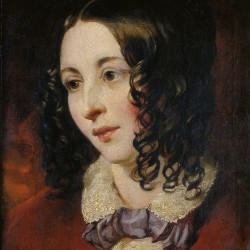
Song for the New Year
Old Time has turned another page
Of eternity and truth;
He reads with a warning voice to age,
And whispers a lesson to youth.
A year has fled o’er heart and head
Since last the yule log burnt;
And we have a task to closely ask,
What the bosom and brain have learnt?
Oh! let us hope that our sands have run
With wisdom’s precious grains;
Oh! may we find that our hands have done
Some work of glorious pains.
Then a welcome and cheer to the merry new year,
While the holly gleams above us;
With a pardon for the foes who hate,
And a prayer for those who love us.
We may have seen some loved ones pass
To the land of hallow’d rest;
We may miss the glow of an honest brow
And the warmth of a friendly breast:
But if we nursed them while on earth,
With hearts all true and kind,
Will their spirits blame the sinless mirth
Of those true hearts left behind?
No, no! it were not well or wise
To mourn with endless pain;
There’s a better world beyond the skies,
Where the good shall meet again.
Then a welcome and cheer to the merry new year,
While the holly gleams above us;
With a pardon for the foes who hate,
And a prayer for those who love us.
Have our days rolled on serenely free
From sorrow’s dim alloy?
Do we still possess the gifts that bless
And fill our souls with joy?
Are the creatures dear still clinging near?
Do we hear loved voices come?
Do we gaze on eyes whose glances shed
A halo round our home?
Oh, if we do, let thanks be pour’d
To Him who hath spared and given,
And forget not o’er the festive board
The mercies held from heaven.
Then a welcome and cheer to the merry new year,
While the holly gleams above us;
With a pardon for the foes who hate,
And a prayer for those who love us.
Eliza Cook
(1818 – 1889)
Song for the New Year
•fleursdumal.nl magazine
January 01, 2025
More in: # Classic Poetry Archive, Archive C-D, Archive C-D
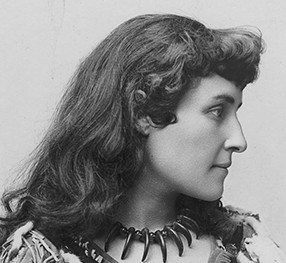
A Cry from an Indian Wife
My Forest Brave, my Red-skin love, farewell;
We may not meet to-morrow; who can tell
What mighty ills befall our little band,
Or what you’ll suffer from the white man’s hand?
Here is your knife! I thought ’twas sheathed for aye.
No roaming bison calls for it to-day;
No hide of prairie cattle will it maim;
The plains are bare, it seeks a nobler game:
’Twill drink the life-blood of a soldier host.
Go; rise and strike, no matter what the cost.
Yet stay. Revolt not at the Union Jack,
Nor raise Thy hand against this stripling pack
Of white-faced warriors, marching West to quell
Our fallen tribe that rises to rebel.
They all are young and beautiful and good;
Curse to the war that drinks their harmless blood.
Curse to the fate that brought them from the East
To be our chiefs—to make our nation least
That breathes the air of this vast continent.
Still their new rule and council is well meant.
They but forget we Indians owned the land
From ocean unto ocean; that they stand
Upon a soil that centuries agone
Was our sole kingdom and our right alone.
They never think how they would feel to-day,
If some great nation came from far away,
Wresting their country from their hapless braves,
Giving what they gave us—but wars and graves.
Then go and strike for liberty and life,
And bring back honour to your Indian wife.
Your wife? Ah, what of that, who cares for me?
Who pities my poor love and agony?
What white-robed priest prays for your safety here,
As prayer is said for every volunteer
That swells the ranks that Canada sends out?
Who prays for vict’ry for the Indian scout?
Who prays for our poor nation lying low?
None—therefore take your tomahawk and go.
My heart may break and burn into its core,
But I am strong to bid you go to war.
Yet stay, my heart is not the only one
That grieves the loss of husband and of son;
Think of the mothers o’er the inland seas;
Think of the pale-faced maiden on her knees;
One pleads her God to guard some sweet-faced child
That marches on toward the North-West wild.
The other prays to shield her love from harm,
To strengthen his young, proud uplifted arm.
Ah, how her white face quivers thus to think,
Your tomahawk his life’s best blood will drink.
She never thinks of my wild aching breast,
Nor prays for your dark face and eagle crest
Endangered by a thousand rifle balls,
My heart the target if my warrior falls.
O! coward self I hesitate no more;
Go forth, and win the glories of the war.
Go forth, nor bend to greed of white men’s hands,
By right, by birth we Indians own these lands,
Though starved, crushed, plundered, lies our nation low . . .
Perhaps the white man’s God has willed it so.
Emily Pauline Johnson
(1861 – 1913)
A Cry from an Indian Wife
Poem
• fleursdumal.nl magazine
More in: # Classic Poetry Archive, *Archive Native American Literature, Archive I-J, Archive I-J, Emily Pauline Johnson, Racism
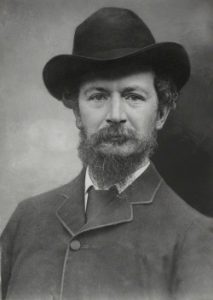
The Complaint of Lisa
(Double Sestina)
Decameron, x. 7
There is no woman living that draws breath
So sad as I, though all things sadden her.
There is not one upon life’s weariest way
Who is weary as I am weary of all but death.
Toward whom I look as looks the sunflower
All day with all his whole soul toward the sun;
While in the sun’s sight I make moan all day,
And all night on my sleepless maiden bed
Weep and call out on death, O Love, and thee,
That thou or he would take me to the dead,
And know not what thing evil I have done
That life should lay such heavy hand on me.
Alas, Love, what is this thou wouldst with me?
What honour shalt thou have to quench my breath,
Or what shall my heart broken profit thee?
O Love, O great god Love, what have I done,
That thou shouldst hunger so after my death?
My heart is harmless as my life’s first day:
Seek out some false fair woman, and plague her
Till her tears even as my tears fill her bed:
I am the least flower in thy flowery way,
But till my time be come that I be dead
Let me live out my flower-time in the sun
Though my leaves shut before the sunflower.
O Love, Love, Love, the kingly sunflower!
Shall he the sun hath looked on look on me,
That live down here in shade, out of the sun,
Here living in the sorrow and shadow of death?
Shall he that feeds his heart full of the day
Care to give mine eyes light, or my lips breath?
Because she loves him shall my lord love her
Who is as a worm in my lord’s kingly way?
I shall not see him or know him alive or dead;
But thou, I know thee, O Love, and pray to thee
That in brief while my brief life-days be done,
And the worm quickly make my marriage-bed.
For underground there is no sleepless bed:
But here since I beheld my sunflower
These eyes have slept not, seeing all night and day
His sunlike eyes, and face fronting the sun.
Wherefore if anywhere be any death,
I would fain find and fold him fast to me,
That I may sleep with the world’s eldest dead,
With her that died seven centuries since, and her
That went last night down the night-wandering way.
For this is sleep indeed, when labour is done,
Without love, without dreams, and without breath,
And without thought, O name unnamed! of thee.
Ah, but, forgetting all things, shall I thee?
Wilt thou not be as now about my bed
There underground as here before the sun?
Shall not thy vision vex me alive and dead,
Thy moving vision without form or breath?
I read long since the bitter tale of her
Who read the tale of Launcelot on a day,
And died, and had no quiet after death,
But was moved ever along a weary way,
Lost with her love in the underworld; ah me,
O my king, O my lordly sunflower,
Would God to me too such a thing were done!
But if such sweet and bitter things be done,
Then, flying from life, I shall not fly from thee.
For in that living world without a sun
Thy vision will lay hold upon me dead,
And meet and mock me, and mar my peace in death.
Yet if being wroth God had such pity on her,
Who was a sinner and foolish in her day,
That even in hell they twain should breathe one breath,
Why should he not in some wise pity me?
So if I sleep not in my soft strait bed
I may look up and see my sunflower
As he the sun, in some divine strange way.
O poor my heart, well knowest thou in what way
This sore sweet evil unto us was done.
For on a holy and a heavy day
I was arisen out of my still small bed
To see the knights tilt, and one said to me
“The king,” and seeing him, somewhat stopped my breath,
And if the girl spake more, I heard not her,
For only I saw what I shall see when dead,
A kingly flower of knights, a sunflower,
That shone against the sunlight like the sun,
And like a fire, O heart, consuming thee,
The fire of love that lights the pyre of death.
Howbeit I shall not die an evil death
Who have loved in such a sad and sinless way,
That this my love, lord, was no shame to thee.
So when mine eyes are shut against the sun,
O my soul’s sun, O the world’s sunflower,
Thou nor no man will quite despise me dead.
And dying I pray with all my low last breath
That thy whole life may be as was that day,
That feast-day that made trothplight death and me,
Giving the world light of thy great deeds done;
And that fair face brightening thy bridal bed,
That God be good as God hath been to her.
That all things goodly and glad remain with her,
All things that make glad life and goodly death;
That as a bee sucks from a sunflower
Honey, when summer draws delighted breath,
Her soul may drink of thy soul in like way,
And love make life a fruitful marriage-bed
Where day may bring forth fruits of joy to day
And night to night till days and nights be dead.
And as she gives light of her love to thee,
Give thou to her the old glory of days long done;
And either give some heat of light to me,
To warm me where I sleep without the sun.
O sunflower made drunken with the sun,
O knight whose lady’s heart draws thine to her,
Great king, glad lover, I have a word to thee.
There is a weed lives out of the sun’s way,
Hid from the heat deep in the meadow’s bed,
That swoons and whitens at the wind’s least breath,
A flower star-shaped, that all a summer day
Will gaze her soul out on the sunflower
For very love till twilight finds her dead.
But the great sunflower heeds not her poor death,
Knows not when all her loving life is done;
And so much knows my lord the king of me.
Aye, all day long he has no eye for me;
With golden eye following the golden sun
From rose-coloured to purple-pillowed bed,
From birthplace to the flame-lit place of death,
From eastern end to western of his way.
So mine eye follows thee, my sunflower,
So the white star-flower turns and yearns to thee,
The sick weak weed, not well alive or dead,
Trod underfoot if any pass by her,
Pale, without colour of summer or summer breath
In the shrunk shuddering petals, that have done
No work but love, and die before the day.
But thou, to-day, to-morrow, and every day,
Be glad and great, O love whose love slays me.
Thy fervent flower made fruitful from the sun
Shall drop its golden seed in the world’s way,
That all men thereof nourished shall praise thee
For grain and flower and fruit of works well done;
Till thy shed seed, O shining sunflower,
Bring forth such growth of the world’s garden-bed
As like the sun shall outlive age and death.
And yet I would thine heart had heed of her
Who loves thee alive; but not till she be dead.
Come, Love, then, quickly, and take her utmost breath.
Song, speak for me who am dumb as are the dead;
From my sad bed of tears I send forth thee,
To fly all day from sun’s birth to sun’s death
Down the sun’s way after the flying sun,
For love of her that gave thee wings and breath,
Ere day be done, to seek the sunflower.
Algernon Charles Swinburne
(1837-1909)
The Complaint of Lisa
(Double Sestina)
Decameron, x. 7
• fleursdumal.nl magazine
More in: # Classic Poetry Archive, Archive S-T, Archive S-T, CLASSIC POETRY, Swinburne, Algernon Charles
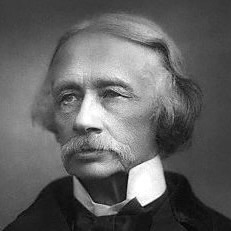
The Revelation
An idle poet, here and there,
Looks round him; but, for all the rest,
The world, unfathomably fair,
Is duller than a witling’s jest.
Love wakes men, once a lifetime each;
They lift their heavy lids, and look;
And, lo, what one sweet page can teach,
They read with joy, then shut the book.
And some give thanks, and some blaspheme
And most forget; but, either way,
That and the Child’s unheeded dream
Is all the light of all their day.
Coventry Patmore
1823–1896
The Revelation
• fleursdumal.nl magazine
More in: # Classic Poetry Archive, Archive O-P, Archive O-P
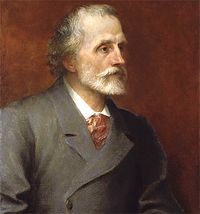
Modern Love: XXIX
Am I failing? For no longer can I cast
A glory round about this head of gold.
Glory she wears, but springing from the mould;
Not like the consecration of the Past!
Is my soul beggared? Something more than earth
I cry for still: I cannot be at peace
In having Love upon a mortal lease.
I cannot take the woman at her worth!
Where is the ancient wealth wherewith I clothed
Our human nakedness, and could endow
With spiritual splendour a white brow
That else had grinned at me the fact I loathed?
A kiss is but a kiss now! and no wave
Of a great flood that whirls me to the sea.
But, as you will! we’ll sit contentedly,
And eat our pot of honey on the grave.
George Meredith
(1828-1909)
Modern Love: XXIX
• fleursdumal.nl magazine
More in: # Classic Poetry Archive, Archive M-N, Archive M-N

The Toys
My little Son, who look’d from thoughtful eyes
And moved and spoke in quiet grown-up wise,
Having my law the seventh time disobey’d,
I struck him, and dismiss’d
With hard words and unkiss’d,
His Mother, who was patient, being dead.
Then, fearing lest his grief should hinder sleep,
I visited his bed,
But found him slumbering deep,
With darken’d eyelids, and their lashes yet
From his late sobbing wet.
And I, with moan,
Kissing away his tears, left others of my own;
For, on a table drawn beside his head,
He had put, within his reach,
A box of counters and a red-vein’d stone,
A piece of glass abraded by the beach
And six or seven shells,
A bottle with bluebells
And two French copper coins, ranged there with careful art,
To comfort his sad heart.
So when that night I pray’d
To God, I wept, and said:
Ah, when at last we lie with tranced breath,
Not vexing Thee in death,
And Thou rememberest of what toys
We made our joys,
How weakly understood
Thy great commanded good,
Then, fatherly not less
Than I whom Thou hast moulded from the clay,
Thou’lt leave Thy wrath, and say,
“I will be sorry for their childishness.”
Coventry Patmore
(1823–1896)
The Toys
• fleursdumal.nl magazine
More in: # Classic Poetry Archive, Archive O-P, Archive O-P, Children's Poetry
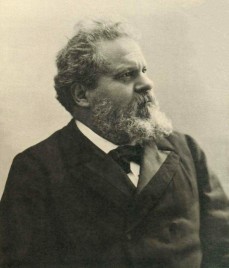
Dante
Strong forms were those of the New Life, that stood
Around thy cradle,
O Master of the song that looks above!
A brave young giantess,
Unknown before to Greek or Latin shores,
Daring in love and hate, and fair withal,
Came Tuscan Libertade, and the child
Already with bounteous breast did comfort thee.
And all a-glowing with her spheral rays,
Mild and austere in one,
Came Faith: and she, across a shore
Obscure with crowds of visions and of shades,
Opened for thee the Gate of the Infinite.
Sighing and pensive, yet with locks aglow
With rosy splendour from another air,
Love made long stay.
And such the gentle things
He talked to thee with bashful lips, so sweetly
He entered all the chambers of thy heart,
That no one ever knew to love like thee.
But soon away from lonely meditating,
O youthful recluse,
Wild clamour and fierce tumult tore thee, and
The fury of brothers seeking brothers’ blood.
Thou heard’st the hissing flames of civil war
On neighbour’s walls; thou heardest women shriek
To heaven that altars and the marriage bed,
The dear hearth-stone and the infant’s cradle,—
All that made fair the marital abode,
Were swept away in one great gulf of flame.
Their men had rushed from their embrace to arms;
The youth breathed only anger and destruction.
Thou sawest the raging of swords
Seeking the breast-plunge;
Thou heardest the dying warrior
Blaspheme and curse:
Before thee, streaming with gore,
Gold locks and grey;
And the Furies offering
To Liberty the execrated host
Of human victims;
And Death, the cruel arbiter of fates,
Crumbling the mighty towers and opening
The long-barred gates.
Amid wild scenes
So grew thy Italian soul,
And prayed that the long civil hate might end.
Meanwhile he saw
Of love such pure revealings and so strange,
The which depicted in the shade
Of a young myrtle-tree,
Each one who saw must bow the head in reverence.
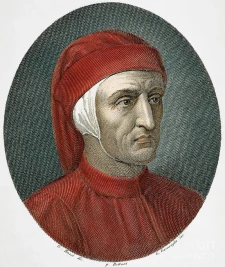
But o’er this gentle dream
There came the voice of weeping,
Bitterly sounding from the maternal source.
Alas! broken by the whirlwind,
Lies the fair myrtle,
And with wide-spread wings
The dove of sweet affection is flown forth
To seek a purer aura for its flight.
He, driven here and there
In the thick darkness of the turbulent age,
Sought refuge with the famous shades of old;
So learned to hate himself and present things.
And in the twilight came he forth a giant,
Seeming a shade himself—an angry shade
Who through the desert went from tomb to tomb,
Now questioning and now embracing them:
Until before him rose across the ruin
And dust of these barbaric ages gone,
Like a cloudy pillar, the ancient Latin valour.
Then all that such a ruin tells did burst
Upon the silent air in one great cry.
In the exalted vision
Arose the poet divine; and now, disdaining
His stricken land and time that only wasted
In petty aimless strife the ancient strength,
He, in the seeing of his heart’s desire,
Saluted thee, O modern Italy,—
One, in thy valiant arms, thy laws, thy speech.
And then, to truly tell
What such a vision meant, he sought to know
The life that rolls through all the sea of being.
From beneath the dust of buried centuries
He made things good and ill to tell their tale
Through him the fatal prophet: till his voice
Resounded through the world, and made the ages
Turn and behold themselves. Judge and lord,
He placed them where they could themselves behold,
Admired and wept, disdained and laughed at them;
Then shut them up in his eternal song,
Well pleased that he had power to do this much.
And meanwhile this poor tangle
Where the weeping and the wailing still goes on,
This endless fraud and shadow
Which has the name of life and is so base,—
All this didst thou despise! Thy sacred muse
Explored the depths of all the universe.
Following the good gentile Philosopher
Who placed thee in the midst of secret things,
Thou didst desire to see as angels see
There where there is no intervening veil;
And thou wouldst love as they do love in heaven.
Up through the ways of love
The humble creature
Pushing his way to the Creator’s presence,
Wished to find rest in that eternal Truth
Which taught thee the great love and the great thought.
Here Virgil failed thee,
And thou, deserted,
A lonely human spirit as if drowned
Within the abyss of thy immense desire,
Didst vanish overwhelmed in doubt,—
When as on wings
Angelical there came unto thy grief
She who is love and light and vision
Between the understanding and the True.
No mortal tongue like mine may give her name,
But thou who lovedst didst call her Beatrice.
And so from sphere to sphere
‘T was naught but melody that thou didst hear,
‘T was naught but one great light that thou didst see,
And every single sense thou hadst was love,
And verse and spirit made one harmony
Like unto her who there revealed herself.
Alas! what caredst thou then
For thy poor country and the endless strife
That rent its cities like, alas! even those
That make forever dark the vales of hell!
From heaven descending thou didst thrice bring down
The Hymn Supreme, and all the while there shone
Upon thy brow a radiance divine
Like his who spake with God in Sinai.
Before thee shining
In all the splendour of the holy Kingdom
Flashed in its crimson light the mortal field
Of Montaperto, and along the wastes
Deserted and malignant came the sound,
Dreary and dull, of dying warriors’ sighs:
To which far off responded
With a great cry of mingled human woe
The cursed battle-field of Campaldino.
And thou, Rea Meloria,
Didst rise from the Tuscan sea
To tell the glory of this horrid slaughter,
And of the Thyrrenian shores made desolate
With this our madness, and the sea’s great bosom
All stained with blood, and far Liguria’s strand
Filled with the moan of lonely Pisan exiles
And children born for fratricidal war.
Giosuè Carducci
(1835 – 1907)
Dante
• fleursdumal.nl magazine
More in: # Classic Poetry Archive, Archive C-D, Archive C-D, Dante Alighieri

Petrarca
If far from turbid thoughts and gloomy mood
Some smiling day should see my wish fulfilled
Where breathe the vales with gentle brooks enrilled
The soft air of my Tuscan neighbourhood,
There, where is heard no more the garrulous brood
Of thoughtless minds, in deep oblivion stilled,
Would I to thee my heart’s pure altar build
In the green blackness of the tangled wood.
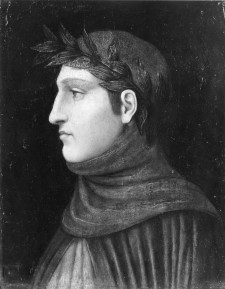
There with the dying splendours of the sun
Thy song should glow amid the flowers springing
On breezy banks where whispering streams do run;
As if, still sweeter sounds and odours flinging
Upward to heaven when the day is done,
A nightingale from bough to bough were singing.
Giosuè Carducci
(1835 – 1907)
Petrarca
• fleursdumal.nl magazine
More in: # Classic Poetry Archive, Archive C-D, Archive C-D, Archive O-P, Petrarca, Francesco
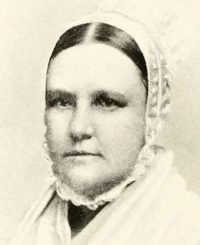
All Alone
Alas! they have left me all alone
By the receding tide;
But oh! the countless multitudes
Upon the other side!
The loved, the lost, the cherished ones,
Who dwelt with us awhile,
To scatter sunbeams on our path,
And make the desert smile.
The other side! how fair it is!
Its loveliness untold,
Its “every several gate a pearl,”
Its streets are paved with gold.
Its sun shall never more go down,
For there is no night there!
And oh! what heavenly melodies
Are floating through the air!
How sweet to join the ransomed ones
On the other side the flood,
And sing a song of praise to Him
Who washed us in His blood.
Ten thousand times ten thousand
Are hymning the new song!
O Father, join Thy weary child
To that triumphant throng!
But oh! I would be patient,
“My times are in Thy hand,”
“And glory, glory dwelleth
In Immanuel’s land.”
Eliza Paul Kirkbride Gurney
(1801 – 1888)
All Alone
• fleursdumal.nl magazine
More in: # Classic Poetry Archive, Archive G-H, Archive G-H

Madrigal
Breaking his way through the white clouds in the azure,
The sun laughs out and cries:
“O Springtime, come!”
Across the greening hills with placid murmurs
The streams sing back to the breeze:
“O Springtime, come!”
“O Springtime, come!” to his heart the poet is saying,
While gazing, O pure Lalage, in thine eyes!
Giosuè Carducci
(1835 – 1907)
Madrigal
• fleursdumal.nl magazine
More in: # Classic Poetry Archive, 4SEASONS#Spring, Archive C-D, Archive C-D

The Evening Star
Hail, pensile gem, that thus can softly gild
The starry coronal of quiet eve!
What frost-work fabrics man shall vainly build
Ere thou art doomed thy heavenly post to leave!
Bright star! thou seem’st to me a blest retreat,
The wearied pilgrim’s paradise of rest;
I love to think long-parted friends shall meet,
Blissful reunion! in thy tranquil breast.
I saw thee shine when life with me was young,
And fresh as fleet-winged time’s infantile hour,
When Hope her treacherous chaplet ’round me flung,
And daily twined a new-created flower.
I saw thee shine while yet the sacred smile
Of home and kindred round my path would play,
But Time, who loves our fairest joys to spoil,
Destined this hour of bloom to swift decay.
The buds, that then were wreathed around my heart,
Now breathe their hallowed sweetness there no more;
‘Twas thine to see them one by one depart,
And yet thou shinest brightly as before.
So, when this bosom, that ‘mid all its woes
Has longed thy little port of rest to win,
In the calm grave shall find at last repose,
Thou’lt beam as fair as though I ne’er had been.
Eliza Paul Kirkbride Gurney
(1801 – 1888)
The Evening Star
• fleursdumal.nl magazine
More in: # Classic Poetry Archive, Archive G-H, Archive G-H

Farewell
Fare thee well, we’ve no wish to detain thee,
For the loved ones are bidding thee come,
And, we know, a bright welcome awaits thee
In the smiles and the sunshine of home,
Thou art safe on the crest of the billow,
And safe in the depths of the sea;
For the God we have worshipped together
Is Almighty, and careth for thee.
And when, in the home of thy fathers,
Thy fervent petition shall rise
For the loved who are circling around thee,
The joy and delight of thine eyes,
Oh, then, for the weak and the faltering,
Should a prayer, as sweet incense, ascend
To the God we have worshipped together,
Remember thy far-distant friend.
We miss the calm light of thy spirit,
We miss thy encouraging smile;
But we bless the unslumbering Shepherd
Who sent thee to cheer us awhile.
The light, which burned brightly among us,
We rejoiced for a season to see,
For the God we have worshipped together
Gave a halo of glory to thee.
But didst thou not point to another,
A brighter, an unsetting sun?
For thou preached not thyself to us, brother,
But Jesus, the Crucified One.
May He be thy rock and thy refuge,
In Him thy “strong confidence” be;
For the God we have worshipped together
Still loveth and careth for thee.
Oh! mayst thou abide ‘neath the shadow
Of Immanuel’s sheltering wing,
And continue proclaiming the goodness
Of Zion’s all-glorious King,
Till the sun shall be turned into darkness,
The moon in obscurity be;
And the God we have worshipped together,
Be a “light everlasting” to thee.
Eliza Paul Kirkbride Gurney
(1801 – 1888)
Farewell
• fleursdumal.nl magazine
More in: # Classic Poetry Archive, Archive G-H, Archive G-H
Thank you for reading Fleurs du Mal - magazine for art & literature